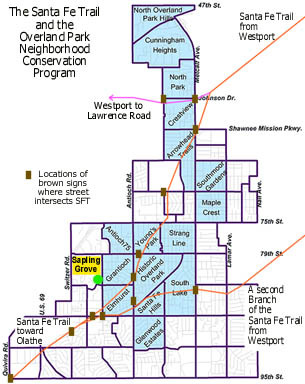Grantioch
Sapling Grove, 10/03

A Stopover on the Santa Fe Trail
A young boy in our Grantioch neighborhood has discovered the history of Comanche park at 83rd and Grant. He and his mother have put forth a proposal to change the park's name to reflect this history.
The boy and his mother were aware that the Santa Fe Trail ran near their home. Upon visiting the Johnson County Historical Museum in the summer of 2003, an exhibit caught there attention which revealed that their local park also played a role in the trail's history.
The first mention of the current park's location appeared in the field notes of George Sibley in 1827 when he was measuring the Santa Fe Trail for the federal government. Sibley recorded that the place was known as "Sappling Grove" where there is an excellent fountain Spring, & a very good place to camp." Through the 1830s Sapling Grove was a familiar rendezvous and camp site for trappers destined for the Rocky mountains, as well as traders destined for Santa Fe. By the late part of that decade it was the regular rendezvous point for the trapping expeditions of the American Fur Company, and the first camp site out of Westport for missionaries and their families destined for the Oregon country. The upper portion of current day Comanche School served as a campgrounds, and the creek below was a watering hole for horses and oxen. (The creek derives from a spring and begins a branch of current day Turkey Creek.)
One of the most compelling features of Sapling Grove is its role as the rendezvous point for the 1841 Bidwell-Bartleson party, generally recognized as the first organized overland emigration party to the Pacific coast. This group of over sixty pioneers departed on their famous journey to the west from Sapling Grove on May 12, 1841. John Fremont likely stayed her in May, 1843, as he began his second of five expeditions to the American west. By 1849 hundreds of forty-niners would have passed through or stopped at Sapling Grove on their way to the California gold fields although by that time the name "Sapling Grove" had vanished into obscurity.
Enthused with the discovery about his local park, the boy said to his mother, "Maybe they should rename the park Sapling Grove." His mother liked the idea, and they decided to see if this were possible. The boy visited his neighbors with a petition requesting their support for the idea; he has gathered over a hundred names.
In August, 2003, the mother and son introduced their proposal to the Overland Park Citizens' Advisory Council [CAC] on Parks and Recreation. They learned that the city's process for renaming a park was primarily designed to honor individuals. But parks in nearby cities had been renamed for historical purposes.
The mother gathered the support of two local historians, and in September presented the story to the Grantioch neighborhood group. She told the group that the Santa Fe Trail in Overland Park was also the California-Oregon Trail; the two did not bifurcate until south of Olathe. She noted that well-known travelers on the trail had included Kit Carson and John C. Fremont. She added that some travelers who loaded up with supplies at Westport realized they had too many by the time they reached Sapling Grove, and dumped the excess on the campgrounds. The Grantioch group was enthused with the story, and voted to support the park's name change, 17 in favor and 1 abstaining.
In late September the name change was put to a vote in the Citizens' Advisory Council. It received a tie of 3 - 3. This sends the decision on to the Overland Park Community Development Committee on November 5, 2003.
Written by Steve Wien, Grantioch Neighborhood Chairperson, and trails historian Craig Crease, current president of the Kansas City Area Historic Trails Association. Mr. Crease is also an independent consultant to the National Park Service concerning the historic trails in the Kansas City area. He has served as a consultant for the KCMO school district "Trails Project", a national program to link students with computer technology through frontier trails history, and he sits on the Development Committee for the National Frontier Trails Center in Independence. A resident of Shawnee, Kansas, Crease is a nationally recognized authority on the Santa Fe Trail. Most recently he delivered a keynote lecture at the national convention of the Santa Fe Trail Association, as well as functioning as the primary history advisor on the Johnson County Museum's exhibit in the frontier trails in Johnson County.


